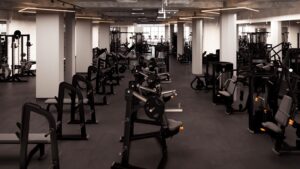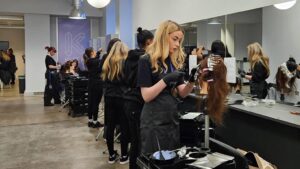
The Basement Gym + Studio opens in Camden Town
Camdenist readers get 50% off their first month’s membership, too

Main image: Xarito, appearing at the Génération A Festival preview at The Place in Euston this June
Following our deep dive into the area’s beloved but constantly threatened pubs, then doing the same for our influential if recently chronically beleaguered nightlife venues, we asked readers where the spotlight of the ongoing Camdenist Culture Campaign should fall next.
The number one request was for us to support the borough’s theatres, stages and performance spaces, nearly all of which have been suffering the same storm of existential challenges common to the grizzly post-Covid, cost of living, end-of-days Tory government epoch.

Camden High Street’s acclaimed pub theatre, tucked up a tight staircase above The Oxford Arms, the Etcetera nearly didn’t make it through the post-lockdown fallout. Run ‘for artists, by artists’ since 1986, it’s a been a vital petri dish for theatre companies and comedians looking to launch themselves towards bigger stages.
Key Challenges?
“Mainly the rise in costs, including utilities, rent and service charges. This not only for us, but reflected both on performers and audience members, too. Theatre is sadly sometimes a luxury that people simply can’t afford when prices rise and other things need prioritising.”
Why should we come and visit?
“We offer very cheap tickets compared to every other theatre in London, and we do many festivals without a hire fee, always looking for emerging artists and new writing.”
Running fringe venues, promoting comedy clubs and taking risks on new playwrights, artists and edgy theatre companies has always been a labour of love. The problem these days is that already wafer thin margins and the goodwill of volunteers have been stretched way beyond breaking point, all during a period when overheads have been shooting up.
Daniel Pitt Director of the Old Diorama Arts Centre (see box) explains how much pressure there is. “My entire career – which has solely been in arts charities – has been under ‘austerity’, so I don’t know the boom years,” he tells us, “but now does really seem bleaker than ever. Artists of all forms are giving up because the simply can’t survive; venues are closing; and the ones that aren’t are becoming boringly commercial – which in itself will only slowly turn loads of people away from them. There needs to be policy change from a government that understands that these sectors need support as part of a thriving society.”
David Brady of Kentish Town’s Lion & Unicorn Theatre agrees that finances lead to safer work, and the loss of skilled people, too.
“The cost of living crisis has really hit both audience members and theatre company’s pockets,” he says, “meaning the focus now has to be on making and creating work which can be as commercially attractive to audiences as possible, while also keeping costs low, and doing more with less.
“A lot of key talent was forced to leave the industry during the pandemic, and so in some areas we’re also seeing a skills shortage as people – particularly in technical areas – left the industry to work elsewhere.”
As with pubs and nightlife, we’re blessed to have a rare wealth of such venues clustered all around us here in Camden, but this somehow makes the prospect of losing any of them feel even more devastating.
Ranging from West End blockbusters like Matilda at Covent Garden’s Cambridge Theatre in the south of the borough, up to the resolutely quirky (and tiny) Pentameters Theatre up in Hampstead, you’ll find a stage nearby showing something for everyone – guaranteed.
There’s been much consternation of late at examples of stratospheric pricing in the West End. Tickets costing over £300 for a ‘dining seat’ for Cabaret at the Playhouse, or just shy of £400 for some kind of ‘premium package’ to see Sarah Jessica Parker and Matthew Broderick in Plaza Suite have been getting social media typically riled.
Meanwhile, on cramped stages in windowless rooms above pubs, or behind decidedly unglitzy backstreet doorways, raw culture is being honed every night of the week – and you are very welcome to come and enjoy it for a fraction of those eye-watering fees.

Made up of 11 studios, two offices and a bright and airy foyer (featuring a coffee cart from Camden-based social impact roastery Honest Grind, who we featured last month, pictured above) OADC brings the power of performance firmly into the lives of local residents.
Key Challenges?
“ODAC is unusual as we’re a creation and participation-focused arts centre. We don’t have a theatre – we use the city around us as our inspiration, collaborator and stage. The last three years have seen this organisation come out of hibernation and go through a rapid revisioning and expansion, implementing new programmes and strengthening relationships with our local community. We’ve been rebuilding our business model, our team and our charitable purpose all at the same time! It’s exciting to see the impact and growth – but it has been a lot of work.
Why should we visit?
Supporting ODAC doesn’t mean buying a ticket, because we don’t sell them. Supporting us means taking part; it means coming to an event or festival we put on, and telling people about us. We achieve this by having more programmes to take part in and experience, and by housing a whole range of local groups of all shapes and sizes which we call our ‘Camden Collabs’ – 34 at last count, from Community Champions Regent’s Park resident group, several groups for displaced Ukrainians, and Camden’s Job Hub. Our income comes from a combination of hires from theatre, TV and film industries, and grants. You are very welcome to donate to us too – that would, absolutely, be a huge support.

For the whole month of August each year, our borough rivals Edinburgh with a fiesta of performance art, from the wacky and wild to the seriously-out-there.
Key Challenges?
“Probably the biggest one has been the unpredictability of audiences. Immediately post-Covid we managed to put on an edition of the festival and it was very popular, as I think people were delighted to be able to go out again and feel a bit normal. But people’s habits have changed – we are less likely to book things a long way in advance and are more inclined to change our minds about attending. I think this is improving slowly, but Covid has left a long shadow.”
Why should we buy a Fringe ticket (or two) this summer?
“We’ve always aimed to provide a safe space for new theatre-makers and performers to try things out, to learn and make mistakes. The Fringe is where a new generation of creators can learn their trade. We try really hard to encourage people and help them get their shows off the ground. Fringe venues can’t exist without customers and audiences. If small spaces showing new and experimental work disappear we’ll end up with a monoculture of just very expensive, big West End blockbuster shows and nowhere to host the weird and wonderful.
With depending on grants becoming ever more vital to this ecosystem’s survival, the ‘savage’ 100% cuts to Arts Council funding for 2023-24, which purposefully hit London theatres and production companies hard as part of the government’s messy ‘levelling up’ agenda, have already done serious cultural damage, and are only really now beginning to really bite.
In Camden, the hugely influential Hampstead Theatre, which traditionally has been a space to try out new writing, has seen resignations, upheaval and horror at the prospect of being forced in a more commercial direction through desperate lack of funds.
Meanwhile, the 43-year-old Gate Theatre (which had just taken up residence in its new home at Theatro Technis 26 Crowndale) now has to focus its limited resources on filling the half a million pound hole in its finances, as opposed to putting on more work.
“Small, independent venues are a dying breed,” say the team at the Etcetera Theatre. “We’ve seen many venues close in the last couple years and we barely made it through ourselves. Small spaces are a vital part of the arts industry as they provide a platform for new artists to try out and hone their skills. Without venues like ours, these artists have nowhere affordable to perform, and art becomes more and more something that’s only available to middle class or upper class people, leaving working class artists out of the equation.”
Doesn’t exactly sound like a levelling up agenda in practical terms, does it? And the potential gulf of inequality doesn’t stop there. Without access to the arts for marginalised communities, we risk taking steps backwards as a society, while losing the cultural vitality that has previously powered London and the UK’s position as a world leader in performing arts.
“Small local venues give an essential place to alternative voices,” say the Etcetera. “We can’t leave everything to become part of the gentrified corporate monster that seems to be creeping out in every corner of our life.”
As with pubs and nightlife, we’re blessed to have a rare wealth of such venues clustered all around us here in Camden, but this somehow makes the prospect of losing any of them feel even more devastating.
Ranging from West End blockbusters like Matilda at Covent Garden’s Cambridge Theatre in the south of the borough, up to the resolutely quirky (and tiny) Pentameters Theatre up in Hampstead, you’ll find a stage nearby showing something for everyone – guaranteed.
There’s been much consternation of late at examples of stratospheric pricing in the West End. Tickets costing over £300 for a ‘dining seat’ for Cabaret at the Playhouse, or just shy of £400 for some kind of ‘premium package’ to see Sarah Jessica Parker and Matthew Broderick in Plaza Suite have been getting social media typically riled.
Meanwhile, on cramped stages in windowless rooms above pubs, or behind decidedly unglitzy backstreet doorways, raw culture is being honed every night of the week – and you are very welcome to come and enjoy it for a fraction of those eye-watering fees.

T his Kentish Town backstreet boozer featuring a popular upstairs stage demonstrates how local theatre should work all over the country. A place where neighbours can casually chance upon a show, be that a challenging new piece or brilliantly promising new performer, simply when popping round the corner for an evening pint.
Key challenges?
“People were keen to support theatres while they were closed by Covid, but it was actually in the year following being allowed to reopen that we saw some of the biggest challenges in terms of growing audiences and keeping them – particularly considering the lack of real support offered to venues by the Government during this time. We’ve been really lucky to have the support of Young’s (the brewery that owns the Lion & Unicorn) and two very supportive General Managers in Phil Daley and Avi Dubey who really understand the value of having a theatre above their pub, and its role within our community. We’ve also had loads of support from London’s very generous theatre creatives and some brilliant marketing partners (London Pub Theatres Magazine, Everything Theatre, the Offies and Individual contributors such as Terri Paddock who really “get” what we’re trying to do and champion us wherever they possibly can.”
Why should we visit?
“We work hard to make sure we’re producing and championing high-quality work from a diverse pool of brilliant emerging and established artists with a year-round programme of great shows, new writing and brave storytelling. It’s really important to me that we continue to be proudly part of Camden and the local community, and in particular support the growth of art and culture in the borough at a time when getting that work made and produced is a real challenge. We want to keep the cost of tickets competitive, keep up the choice and variety in the work we produce, tell great stories, and continue our mission to provide our audiences the opportunity to discover new work which they might not have considered before and ultimately have a great night out.”

Martin Besserman has been thrusting flyers for his comedy shows into the hands of Camden’s pedestrians for over two decades. His regular gigs above assorted local pubs have seen early appearances from the likes of Michael McIntyre, Harry Hill and Lee Mack. These days he runs an early comedy club and a later cabaret show Fridays and Saturdays at the All About Eve bar on Jamestown Rd.
Key Challenges?
People working from home. That’s made it an extra effort on my part as producer and promoter to do my best, with very limited resources, to market to them. It’s always challenging to get people in, but we do get lots of excellent feedback and reviews on Google and Design My Night. Without that word of mouth recognition today it would be a much harder task. I’d say to anybody putting on any show now, you need to maximise everything. You really do have to throw all your love and heart and soul into putting on especially brilliant shows if you want to succeed.
Why should we visit?
If I’m allowed to blow my own trumpet; people who come to my little gig really do have a fantastic time. A lot of people say to me ‘this is the best thing in Camden’ – and they really mean it. The audiences always appreciate what we do, and I think that’s because it’s fun and not overpriced to get in. I’m not doing it for the money anyway – I’d be mad if I was – and I think that shines through, too. I do it for the love of it, I host most of the shows myself, but then I am good at it!
Make sure to read the Camdenist weekly newsletter, in your inbox every Friday morning and now featuring a curated list of local shows to see over the week ahead, plus all the local cultural gossip, campaigning and highlights.
Keeping things lean is clearly a vital skill, and leads to some organisations really punching above their perceived weight. Camden Fringe puts on over 300 shows at 20 different venues across the area each summer, yet is still run on a shoestring by two mates, Zena Barrie and Michelle Flower.
“We’re lucky in that we are a very small set-up so our overheads aren’t huge as there are just two of us and we both work from our homes,” says Michelle. “This is much easier than being a bricks and mortar venue with a lot of staff to support. We try and offer help wherever we can, and we’ve published 37 episodes of a podcast where we interview various industry insiders and explain all the aspects of making a career in the theatre and comedy world.”
As ever in this game, it is passion and dedication that drives so many of the key people involved, rather than trying to win big at the impossible economics. So, despite all the doom and gloom we’ve mentioned thus far, the world of the stage remains persistently optimistic, regardless. It has to.
“The world is in such a mess, and it has been for some time,” says Martin Besserman of Camden Cabaret. “People need a way to get away from that, and I’d like to think I play my part in contributing – at least temporarily – to them escaping all that for a moment or two and just having a bit of fun. My legacy has to be the contribution I’ve made to people’s stimulation, and I really thrive on seeing other people having a great time.”
Gathering in the same space to laugh, cry or dance and sing together will always beat a night in front of Netflix, however good the box set. Camden’s many grassroots venues and promoters are at hand just waiting to provide a night out that’s lots more fun, and is also increasingly seen as vital to our social health, particularly in an atomised digital era. There’s a lot to be said for French sociologist Emile Durkheim’s notion of collective effervescence; a feeling of belonging and assimilation produced by collective ritual action.
“More broadly in our society, we need to be encouraging, and making it possible and welcoming, for people to take risks on things they don’t always know what they are going to be,” says ODAC’s Daniel. “In an increasingly divided society, we need spaces to come together, and we need to be (re)building people’s desire to see and hear stories that we don’t know the end of, meet ideas that we don’t relate to, and have experiences that are new. Do ‘support’ them – buy drinks and donate, if you can – but really, I want people to be going because they want to, not because they feel they have to.”
So while you consider where to go (and remember, some places even run shows for free if your budget is limited), feel rightly blessed to have so many options so near by. Don’t ever take it for granted, because the struggle is about as real as it ever was right now, and everyone involved is quite literally fighting for the health and future security of our creative culture.
“The brilliant thing about fringe theatre and local venues, particularly of the kind which exists in volume in London is that you can see brand new stories and brave new worlds from the talent of the future for a fraction of the cost of seeing shows in bigger venues,” says David Brady. “The breadth of storytelling and ambition is staggering, as is the love, passion and dedication you can find on any stage in a small venue from hugely talented professionals any night of the week.”
It’s a call to arms. Go out and be entertained.
Make sure to read the Camdenist weekly newsletter, in your inbox every Friday morning and now featuring a curated list of local shows to see over the week ahead, plus all the local cultural gossip, campaigning and highlights.

Camdenist readers get 50% off their first month’s membership, too

A brand new hairdressing and barbering academy has landed in Camden Town and is now seeking style-conscious models and enthusiastic trainees

We speak to founder, Sol, about bringing the studio to Kentish Town

Explore the neighbourhood’s brand new neighbourhood